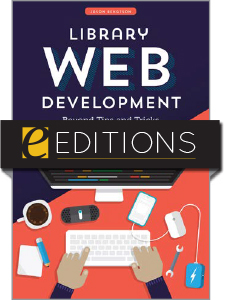
Library Web Development: Beyond Tips and Tricks—eEditions e-book
The download link for this product can be found on the final confirmation screen after you complete your purchase, and may also be accessed from your Account Profile. For more information about ALA eEditions file types and how to view them on eReaders, desktop computers, and other devices, see this page.
Primary tabs
You don't need to be an ALA Member to purchase from the ALA Store, but you'll be asked to create an online account/profile during checkout to proceed. This Web Account is for both Members and non-Members. Note that your ALA Member discount will be applied at the final step of the checkout process.
If you are Tax-Exempt, please verify that your account is currently set up as exempt before placing your order, as our new fulfillment center will need current documentation. Learn how to verify here.
- Description
- Table of Contents
- About the author
- Reviews
Plenty of resources offer you snippets of code and a variety of tutorials can show you the solutions to web development problems. But it’s much more valuable (and a better investment of your time!) to learn some core problem-solving skills. This book shares key rules and strategies that will empower you to become a confident coder and web developer, ready to think through whatever complications present themselves. Bengtson, an expert developer, describes 11 challenges typical of a library setting and ones he has faced himself. He then walks you through his thinking, with explorations of alternate approaches, as he works toward a solution. As you follow along, you’ll gain wisdom involving scenarios such as
- integrating a reader app with Dspace;
- tips when using a public API;
- troubleshooting a Google Analytics Event hook in a new application;
- building a database from a collection of CSV files;
- collecting information from a university’s web pages to display in the library website; and
- moving mass quantities of information to the next page of your app.
Armed with the conceptual foundation outlined in this book, you’ll be ready to meet the web development challenges you face in your library.
Preface
Chapter 1 The Problems We Need to Solve
Chapter 2 Tracking Just About Anything in the Client
Chapter 3 Moving Data between Your Web Pages
Chapter 4 Wrestling Same Origin Policy (Or, Why Won’t My App Read This Data?)
Chapter 5 Using FIFIOs to Extract Data without an API
Chapter 6 Using Sideways Development to Improve Web Interfaces
Chapter 7 Pulling Data from Multiple Sources for a Single Interface
Chapter 8 Making a Mobile-Friendly Image Map
Chapter 9 Using Server-Side Scripting to Reshape Troublesome Data
Chapter 10 A Few Last Rules to Follow
Afterword
- Appendix A The Rules
- Appendix B Next Steps
Index
Jason Bengtson
Jason Bengtson is Head of Library Technology Services at Washington University Libraries. Previously, he was Head of Information Technology Services at Kansas State University Libraries, where he held the academic rank of Assistant Professor. He is a full stack web developer, and the author of numerous articles on library technology.
"Say you want to do more-advanced web analytics, extract data without an API, or make a mobile-friendly image map. If you understand the above sentence and have these web-design needs for the library, this book might be just the ticket ... Bengston writes in a breezy, accessible style, and yet his approach is no-nonsense."
— Booklist
"In addition to discussing the many challenging scenarios that he has experienced as a library web developer, such as customizing Google Analytics or building interactive maps, the author shares his ten rules for thinking critically and solving coding-related issues in libraries and demonstrates how these are applied in practice ... Library staff who are mostly self-trained web developers will likely find this helpful in navigating the dynamic and complex web development landscape."
— Library Journal
"This book focuses on how to systematically solve web coding puzzles using critical thinking and holistic examination of the task in context ... Conceptional frameworks alternate with real-life code solutions to illustrate issues from a library perspective."
— CHOICE


